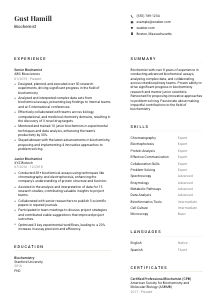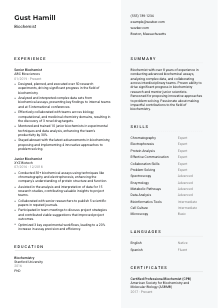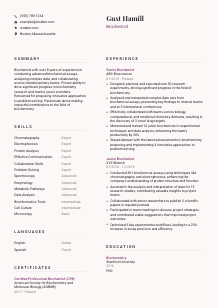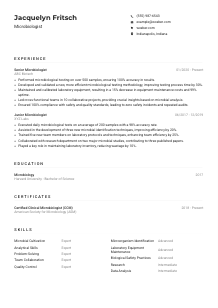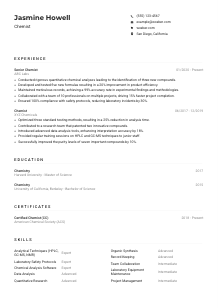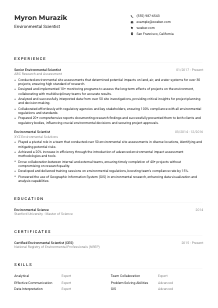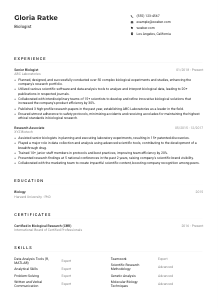Biochemist Resume Example
Delving into molecules, but your resume seems microscopic? Zoom into this Biochemist resume example, formulated with Wozber free resume builder. Discover how to blend the intricacies of your scientific prowess with job requirements, preparing a career synthesis as groundbreaking as your experiments!
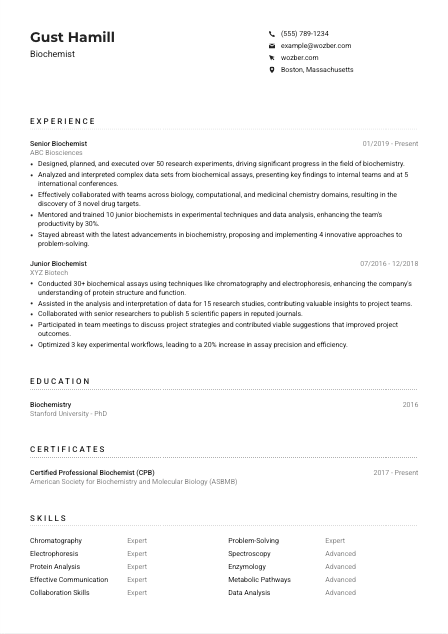
How to write a Biochemist Resume?
Greetings, aspiring Biochemist! Embarking on the journey to land your dream job isn't just about having an arsenal of qualifications; it's about presenting them in a way that speaks volumes to hiring managers. Your resume is your golden ticket - a meticulously curated document that showcases your expertise, achievements, and passion for biochemistry. By leveraging the power of Wozber free resume builder, this guide is specially tailored to help you craft a resume that's not only a reflection of your accomplishments but also perfectly aligns with the specific demands of your desired role as a Biochemist.
Ready to synthesize a career-defining resume? Let's dive in!
Personal Details
In biochemistry, as in all sciences, precision and attention to detail are paramount. The same goes for the Personal Details section of your resume. Think of this as the 'primer' in a PCR reaction, setting the stage for a successful amplification of your qualifications.
1. Start with Your Name
Your name is the 'label' on your professional sample. Ensure it's prominently displayed, using a clear, professional font. Just as a well-labeled sample vial instills confidence in its contents, your name should instill confidence in your professional brand.
2. Align with the Job Title
"Biochemist" isn't just a career; it's a declaration of your expertise. Positioning this title prominently on your resume immediately aligns you with the job at hand, signaling to hiring managers your focused career trajectory.
3. Include Essential Contact Information
Like ensuring your experiments have no contamination, double-check your contact details for inaccuracies. Your phone number and email should be the
4. Highlight the Required Location
The job's location, Boston, Massachusetts, is not just a geographic coordinate but a key detail that aligns with the employer's requirements. Indicating your readiness to be in Boston takes away any relocation hesitation from the hiring manager's mind, much like eliminating a variable in an experiment.
5. Consider Adding a Professional Profile or Personal Website
In the realm of scientific research, data sharing and collaboration are invaluable. Similarly, adding a LinkedIn profile or a personal website dedicated to your professional achievements can serve as a database for hiring managers to explore your scientific contributions in depth.
Takeaway
Think of the Personal Details section as the critical first step in your experimental protocol, where accuracy and alignment with the end goal are key. Just as in the lab, the initial setup dictates the experiment's success, so too does this section set the stage for a winning resume.





Experience
In the world of biochemistry, your research and discoveries speak volumes about your capabilities. The Experience section of your resume is where you distill years of lab work, collaboration, and innovation into compelling evidence of your suitability for the Biochemist role.
- Designed, planned, and executed over 50 research experiments, driving significant progress in the field of biochemistry.
- Analyzed and interpreted complex data sets from biochemical assays, presenting key findings to internal teams and at 5 international conferences.
- Effectively collaborated with teams across biology, computational, and medicinal chemistry domains, resulting in the discovery of 3 novel drug targets.
- Mentored and trained 10 junior biochemists in experimental techniques and data analysis, enhancing the team's productivity by 30%.
- Stayed abreast with the latest advancements in biochemistry, proposing and implementing 4 innovative approaches to problem‑solving.
- Conducted 30+ biochemical assays using techniques like chromatography and electrophoresis, enhancing the company's understanding of protein structure and function.
- Assisted in the analysis and interpretation of data for 15 research studies, contributing valuable insights to project teams.
- Collaborated with senior researchers to publish 5 scientific papers in reputed journals.
- Participated in team meetings to discuss project strategies and contributed viable suggestions that improved project outcomes.
- Optimized 3 key experimental workflows, leading to a 20% increase in assay precision and efficiency.
1. Break Down the Job Requirements
Before scribing your experiences, dissect the job description as you would a complex molecular pathway. Your goal is to identify and understand each component, ensuring your experiences reflect the skills and achievements most relevant to the job.
2. Structure with Roles and Companies
Chronologically organize your experiences, akin to a well-organized lab notebook. Start with your most recent role, detailing your position, the company's name, and your tenure there. This structure offers a clear, easy-to-follow narrative of your professional development.
3. Craft Targeted Accomplishment Statements
"Designed, planned, and executed over 50 research experiments, driving significant progress in the field of biochemistry" isn't just an accomplishment. It's a testament to your scientific acumen, showcasing your hands-on experience and impact in the field, directly mirroring the job's responsibilities.
4. Quantify Achievements When Possible
In the scientific community, data is everything. Quantifying your achievements, whether in terms of experiments conducted, papers published, or conferences attended, adds credibility and depth to your resume, much like empirical evidence supports a hypothesis.
5. Keep It Relevant
While it might be tempting to list every single project you've worked on, focus on those most relevant to the Biochemist role. Think of your resume as a targeted therapy—a specific approach designed to interact with the 'receptors' of the job description.
Takeaway
Your Experience section is your research highlight reel. It's your chance to impress upon hiring managers the depth of your expertise and the breadth of your contributions to the field of biochemistry. Tailored, quantified, and relevant – that's the formula for a standout Experience section.
Education
In biochemistry, every discovery builds on foundational knowledge. Similarly, the Education section of your resume is a showcase of the academic groundwork that has prepared you for a career in this complex field.
1. Pinpoint the Key Educational Requirement
The job description asks for a "PhD in Biochemistry, Molecular Biology, or a related field." This is not just a requirement; it's a clue to what the employer values most. Highlighting your PhD front and center associates you with the elite academic proficiency the role demands.
2. Structure with Simplicity
Like a well-organized lab report, present your academic qualifications in a clear, concise manner. List your degree, field of study, the institution, and your graduation year. This straightforward structure ensures the hiring manager can quickly appraise your educational background.
3. Tailor Your Degree Details
Your PhD in Biochemistry isn't just a degree; it's evidence of years dedicated to mastering your field. Match the education specifics to the job criteria to underscore your direct fit for the role's requirements.
4. Highlight Relevant Courses (if needed)
In some cases, particularly early in your career, listing specific courses can further demonstrate your expertise in areas directly relevant to the job. For a seasoned Biochemist, though, the breadth of your research and experience will speak louder than coursework alone.
5. Consider Other Educational Achievements
While your degrees lay the groundwork, any additional honors, clubs, or special projects related to biochemistry add another layer to your qualifications. However, measure their relevance by the level of the position you're applying for; senior roles might emphasize professional achievements over academic ones.
Takeaway
Your Education section is a testament to the rigorous academic journey you've embarked upon, laying the groundwork for your success in biochemistry. Highlight your highest degrees, align them with the job requirements, and remember, this section is but one part of a comprehensive narrative that comprises your career.
Certificates
In the fast-evolving field of biochemistry, continuing education and certification reinforce your commitment to staying abreast of the latest developments. The Certificates section of your resume is where you showcase these efforts, adding depth to your qualifications.
1. Extract Key Job Requirements
While the job description might not explicitly demand certain certifications, understanding the underlying skills and knowledge required allows you to strategically present certifications that enhance your profile.
2. Pick Certificates that Resonate
Given the highly specialized nature of biochemistry, select certifications that best align with the role's demands. This could include areas like "Certified Professional Biochemist (CPB)" from the American Society for Biochemistry and Molecular Biology (ASBMB), which directly speaks to your commitment to excellence in the field.
3. Be Transparent with Dates (if relevant)
Just as you'd keep your lab certifications up to date, ensure the validity of your professional certifications is clear. This shows not only your qualifications but also your dedication to maintaining professional standards.
4. Stay Updated
The field of biochemistry doesn't stand still, and neither should your professional development. Regularly pursue new certifications and learning opportunities, especially those that directly enhance your expertise in areas relevant to your career goals.
Takeaway
Just like a well-validated assay, the Certificates section adds rigor and credibility to your resume. It highlights your ongoing commitment to professional growth and ensures you're viewed as a candidate who remains at the forefront of the biochemistry field.
Skills
In biochemistry, enzymes catalyze reactions, just as your skills catalyze your career progress. Your resume's Skills section is a concise showcase of the technical and soft skills that make you an effective Biochemist, directly mirroring the requisites of the job.
1. Decode the Job Requirements
Extract both explicit and implicit skills from the job description. For example, a strong "understanding of protein structure and function" indicates not only technical expertise but also problem-solving abilities and attention to detail.
2. List Skills that Directly Align
From chromatography to protein analysis, match your skills with those listed in the job description. This direct alignment helps pass the 'first filter' of an ATS scan, ensuring your resume makes it to human hands.
3. Keep It Neat and Organized
Avoid the temptation to list every skill you possess. Instead, prioritize those most relevant to the Biochemist position, creating a focused snapshot of your professional capabilities.
Takeaway
The Skills section of your resume should succinctly communicate the essential technical and soft skills that enable you to excel as a Biochemist. Carefully curate this list to reflect the job description, ensuring an ATS-compliant resume that catches the hiring manager's eye.
Languages
In the global field of biochemistry, language skills can significantly broaden your collaborative and research opportunities. The Languages section of your resume isn't just about listing languages you speak; it's about showcasing your ability to engage in diverse scientific communities.
1. Review the Job Requirements
The job description emphasizes "Proficient English speaking and listening skills." This requirement isn't just a formality; it's crucial for effective communication in multinational teams and at international conferences.
2. Highlight Essential Languages
Start with English, detailing your proficiency level, then list any additional languages you speak. Even if additional languages aren't required, they can set you apart as a candidate with broader communication abilities.
3. List Other Languages You Know
Include any other languages you're familiar with, as this can highlight your adaptability and readiness for collaboration in international settings. Each language you speak is a bridge to another scientific community.
4. Be Honest About Your Proficiency
Use clear, standardized terms to describe your language proficiency, ensuring you set realistic expectations about your ability to communicate in different languages.
5. Understand the Role's Scope
For roles that involve international collaboration, emphasizing your multilingual abilities can be particularly advantageous, demonstrating your preparedness for engaging with global scientific discussions.
Takeaway
Like a versatile analytical method, your language skills enhance your ability to navigate the diverse landscape of the biochemistry community. Even if the role doesn't explicitly require additional languages, presenting yourself as a multilingual professional can significantly enhance your appeal.
Summary
The Summary section of your resume is akin to the abstract of a research paper. It provides a concise overview of your qualifications, drawing the reader in and encouraging them to delve deeper into the substance of your professional 'manuscript.'
1. Understand the Essence of the Job
Begin by absorbing the essence of the job description. Just as you would tailor an experiment to achieve specific results, tailor your summary to reflect the key qualities the job demands.
2. Begin with an Introduction
Introduce yourself as a Biochemist, highlighting the breadth of your experience and your passion for advancing the field of biochemistry. This positions you as a dedicated and experienced candidate from the outset.
3. Address Key Job Requirements
Enumerate your most potent skills and achievements, directly aligning them with the critical requirements outlined in the job description. This targeted approach immediately presents you as a highly relevant candidate.
4. Keep It Concise
Your summary should be brief and impactful, capturing the essence of your professional persona and enticing the hiring manager to learn more about your scientific journey.
Takeaway
Crafting an engaging summary is your opportunity to encapsulate your professional identity and aspirations within a few powerful sentences. Just like a well-written abstract makes a research paper stand out, a compelling summary makes your resume memorable. Let it shine as the beacon of your application, inviting further exploration into the depth of your biochemistry career.
Launching Your Biochemist Journey
Congratulations, you've now navigated each crucial segment of crafting a resume tailored for the Biochemist position. Armed with these insights, your resume is not just a document; it's a nuanced presentation of your professional narrative, designed to resonate with hiring managers. By using Wozber free resume builder, including its ATS-friendly resume template and ATS resume scanner for optimization, you're well-prepared to tailor your application for success. Remember, your journey in the biochemistry field is unique; let your resume reflect that distinction.
Now, go forth and claim your place in the scientific community. Your next breakthrough could be just an application away!

- PhD in Biochemistry, Molecular Biology, or a related field with a minimum of 5 years of industry or academic research experience.
- Expertise in a range of biochemical techniques such as chromatography, electrophoresis, and spectroscopy.
- Strong understanding of protein structure and function, enzymology, and metabolic pathways.
- Proficiency in using bioinformatics tools and software for data analysis and interpretation.
- Effective communication and collaboration skills, both written and verbal, to work in multidisciplinary teams.
- Proficient English speaking and listening skills necessary.
- Must be located in or willing to relocate to Boston, Massachusetts.
- Design, plan, and execute research experiments to drive understanding and progress in the field of biochemistry.
- Analyze and interpret complex data sets, presenting findings to internal teams and at conferences.
- Collaborate with cross-functional teams, including biology, computational, and medicinal chemistry, to drive drug discovery projects.
- Mentor and train junior scientists in experimental techniques and data analysis.
- Keep up to date with the latest advancements in biochemistry and propose innovative approaches to problem-solving.





